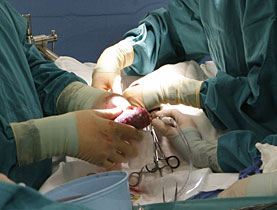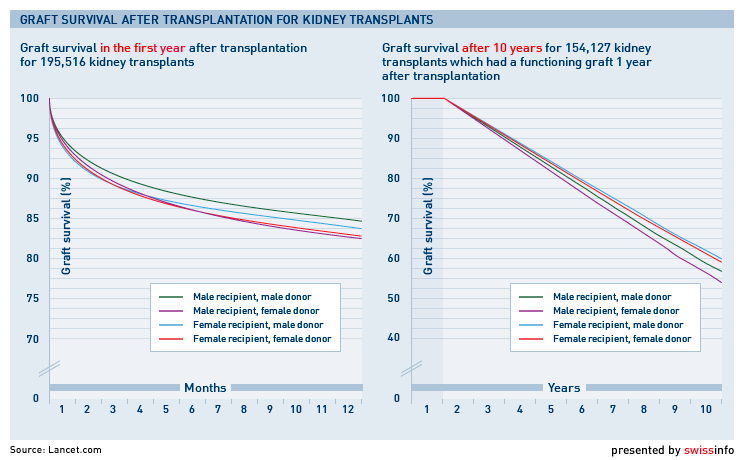Donor sex may influence transplant success

The results of a Swiss-led study on the long-term success of kidney transplants suggest that organs should be distributed to recipients of the same sex as the donor.
The findings, published in the British medical journal The Lancet, indicate that male recipients of female grafts have an increased risk of graft-versus-host disease.
“Consideration of sex should be integrated into future prospective analyses and decisions on organ allocation,” the study’s authors wrote.
Male recipients could probably profit from male kidneys, which contain higher nephron doses, researchers said. Nephron doses are the basic structural units of the organ; the higher the dose, the stronger the kidney.
Female recipients might not need the same number of nephrons as men, and could profit from the lower likelihood of rejection associated with a sex-matched donor kidney.
All things considered, the suspected drawbacks in compatibility associated with male-to-female transplantation are for the most part negated when weighed against the benefits of receiving the more robust male kidney, according to the study.
“The survival for a female and male kidney in females is exactly the same,” Professor Alois Gratwohl of Basel University Hospital told swissinfo.
“Females are not harmed if they receive a male kidney. In contrast, males have a much better survival rate with male kidneys than with the smaller female kidney.”
The findings were the result of data collected from 195,516 transplants from deceased donors carried out at 400 sites across Europe between 1985 and 2004.
The study was conducted in collaboration with the Department of Transplantation Immunology at Heidelberg University in Germany, and funded in part by the Swiss National Science Foundation and the European Leukaemia Net.
In 2007, there were 920 patients waiting to receive new kidneys in Switzerland and 242 that received transplants according to Swisstransplant, the country’s organ donation and transplantation foundation.
Same sex benefits
The notion that the donor sex could affect compatibility with the recipient was until now confined mostly to the field of stem cell transplantation.
“So far, this phenomenon that females are more likely to reject male grafts, and in hematopoietic stem cell transplantation, that male recipients of female grafts suffer more from graft-versus-host disease is recognised,” said Gratwohl, a stem cell specialist.
“But it has been disputed over the last decades that it is important in kidney transplantation as well.”
The cross-disciplinary research could yield lessons that both organ transplant specialists and stem cell researchers might find beneficial in the long run.
“Chronic kidney graft rejection has many similarities with chronic graft-versus-host disease, which is so important in stem cell transplantation,” Gratwohl added.
“We learn from each other that there are certain biological principles that hold true in all situations and there are truly differences.”
Franz Immer, director of Swisstransplant, agrees that there are some issues where kidney transplantation may be combined with stem cell transplantation.
“Probably in the future, patients receiving a kidney may also receive stem cells.”
Gender differentiation
Swisstransplant is presently supporting a working group led by Gratwohl exploring commonalities between stem cell and organ transplantation.
However it is not incorporating gender into its allocation algorithm as had been suggested in this week’s report in The Lancet, according to Immer.
“In the ongoing allocation system, there is no path marking the difference between men and women,” he told swissinfo.
“There are just the outcome data suggesting that men’s kidneys are stronger, so there are a few data, but not a lot,” he added.
Switzerland’s system is in line with the rest of Europe. Gratwohl admits that the scarcity and short shelf life of fresh organs often forces a compromise.
UK Transplant, Britain’s organ transplantation organisation, said its own survey had found no differences in rejection rates. “No statistical evidence was found to suggest any of the sex-related factors significantly affected post-transplant graft survival,” a spokesman for the organisation was quoted in a BBC report.
“Therefore, donor to recipient sex matching is not something that is considered in the kidney allocation scheme.”
In a commentary in The Lancet, Connie Davis of Washington University in the United States said that new research into the donor tissue sex could no longer be ignored, but added the data were too preliminary to think about changing the way what organs are distributed.
“A lot of work still needs to be done on the actual [causes] and the immunological responses that might be associated with rejection,” she wrote. “The science is still too premature to suggest that allocation schemes from dead donors or selection of living donors for transplantation take notice of this effect.”
swissinfo, Justin Häne
Graft-versus-host disease is a common complication in transplantation in which the immune cells in an organ recognise their new home as “foreign” and reject it.
The acute form of the disease occurs within 100 days after the transplant. The disease is usually classified as chronic if it occurs after 100 days of the transplant.
Chronic rejection of a transplanted organ is irreversible. It can be suppressed but not treated effectively. The only solution is a new transplant.
Hematopoietic stem cell transplantation is the transplantation of stem cells from the bone marrow to a new host.
The risky procedure is usually performed on patients with life-threatening blood or bone marrow diseases, or specific types of cancer.
Overall 1,371/418
Heart 64/29
Lung 75/34
Liver 243/87
Pancreas 36/12
Kidney 920/242


In compliance with the JTI standards
More: SWI swissinfo.ch certified by the Journalism Trust Initiative



You can find an overview of ongoing debates with our journalists here. Please join us!
If you want to start a conversation about a topic raised in this article or want to report factual errors, email us at english@swissinfo.ch.